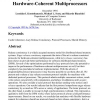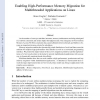14 search results - page 2 / 3 » Improving the lazy Krivine machine |
SC
1995
ACM
13 years 11 months ago
1995
ACM
Release consistency is a widely accepted memory model for distributed shared memory systems. Eager release consistency represents the state of the art in release consistent protoc...
CC
2003
Springer
13 years 11 months ago
2003
Springer
Abstract. Inline-threaded interpretation is a recent technique that improves performance by eliminating dispatch overhead within basic blocks for interpreters written in C [11]. Th...
ICML
2000
IEEE
14 years 8 months ago
2000
IEEE
Most machine learning algorithms are lazy: they extract from the training set the minimum information needed to predict its labels. Unfortunately, this often leads to models that ...
ECAI
2010
Springer
13 years 8 months ago
2010
Springer
Abstract. Learning in the context of constraint solving is a technique by which previously unknown constraints are uncovered during search and used to speed up subsequent search. R...
IPPS
2009
IEEE
14 years 2 months ago
2009
IEEE
As the number of cores per machine increases, memory architectures are being redesigned to avoid bus contention and sustain higher throughput needs. The emergence of Non-Uniform M...


